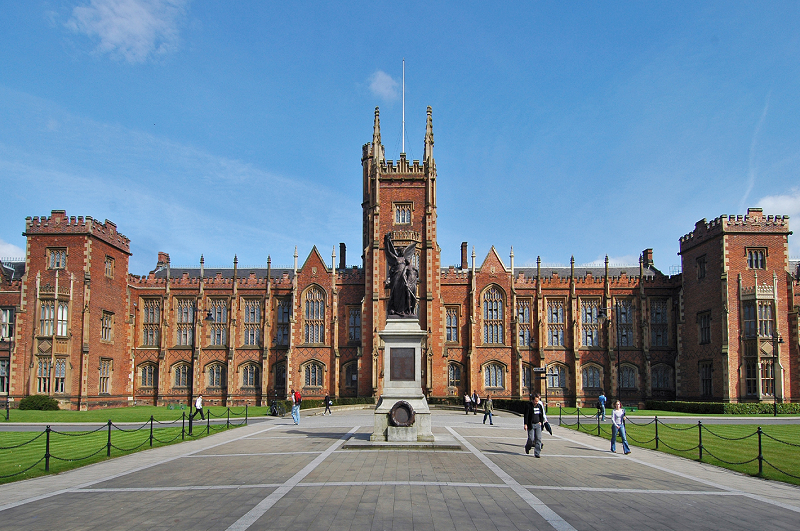
How the University assures the quality and maintains the academic standards of its Research Degree Programmes
The Queen's Code of Practice for Research Degree Programmes forms an integral part of the University’s quality assurance mechanisms and is designed to assure the quality and maintain the academic standards of Research Degree Programmes, bringing consistency to research degree provision.
The Code of Practice for Research Degree Programmes has been written for students, staff, examiners, and other stakeholders. It provides links to the Study Regulations for Research Degree Programmes, and outlines University procedures, processes and areas of good practice.
The Code of Practice for Research Degree Programmes complements, but is not a substitute for the existing Study Regulations for Research Degree Programmes. Staff and students should refer to the Study Regulations for Research Degree Programmes in the first instance, in addition to the wider General Regulations. In the event of any conflict of interpretation between the Code of Practice for Research Degree Programmes and the regulations, the regulations prevail.
-
The UK Quality Code
The Quality Assurance Agency (QAA) publishes the UK Quality Code for Higher Education (the Quality Code) which acts as the definitive reference point for all UK Higher Education (HE) providers. It outlines what HE providers are required to do, what they can expect of each other, and what the general public can expect of them.
This Queen’s Code of Practice for Research Degree Programmes has been updated with full cognisance of the UK Quality Code (May 2018), and demonstrates how the University meets the Quality Code’s expectations for Standards and Quality, the practices regarding Research Degrees and the guiding principles outlined within the supporting Advice and Guidance related to Research Degrees.
Queen’s takes account of The Frameworks for Higher Education Qualifications of UK Degree Awarding Bodies, the QAA Doctoral Degree Characteristics Statement, and other UK and European reference points in order to secure the academic standards of its Research Degree Programmes.
The Study Regulations for Research Degree Programmes and this accompanying Code of Practice for Research Degree Programmes, (and in the case of the Professional Doctorate and Integrated PhD programmes programmes – Principles for Professional Doctorates and Integrated PhDs, Study Regulations for Postgraduate Taught Programmes, and the relevant Programme Specification), form the academic framework for Queen’s Research Degree Programmes, which outlines how the University awards academic credit (where relevant) and Research Degree Programme qualifications. These documents also represent the definitive record for the respective Research Degree Programmes.
-
Queen's Research Degree Programmes
The Code of Practice for Research Degree Programmes applies to all the Research Degree Programmes (including the research elements of Professional Doctorates) offered by the University:
Doctor of Philosophy (PhD)
Doctor of Philosophy (by Published Works) (PhD)
Integrated Doctor of Philosophy (PhD)
Master of Philosophy (MPhil)
Doctor of Medicine (MD)
Master of Surgery (MCh)*
Professional Doctorates
Doctor of Childhood Studies (DChild)
Doctorate in Clinical Psychology (DClinPsych)
Doctor of Education (EdD)*
Doctor of Education (EdD) TESOL*
Doctorate in Educational, Child and Adolescent Psychology (DECAP)
Doctorate in Midwifery Practice (DMP)*
Doctorate in Nursing Practice (DNP)*
Engineering Doctorate (EngD)
Juris Doctor (JD)*
*no longer open for new applications
-
University Regulations, Policies and Procedures: Overview
The University has specific Study Regulations for Research Degree Programmes which are updated on an annual basis, and include the following areas:
- Registration.
- Regulations relating to external students and students working away from the University for a period.
- Minimum and maximum periods of study.
- Progress including supervision, monitoring and the Annual Progress Review process.
- Assessment and Award of Degree including requirements for Master’s/Doctoral degrees, appointment of examiners, and the examinations process.
The Study Regulations for Research Degree Programmes are contained within the University Calendar: General Regulations which is revised annually and includes the following areas:
- Principles for Professional Doctorates and Integrated PhDs.
- Regulations for Students including definitions, admissions procedures, fees, and graduation.
- Temporary withdrawal.
- Academic Appeal Regulations (Research Degree Programmes).
- Conduct Regulations and other regulations for the use of laboratories and the library.
- A range of procedures including those for dealing with academic offences, Fitness to Practise (particularly relevant to Professional Doctorates), and the Student Complaints Procedure.
- A range of policies including the Equality and Diversity Policy, the Student Disability Policy, and the Student Maternity, Maternity Support and Adoption Policy.
The Study Regulations for Research Degree Programmes are complemented at School level by a range of information including guides to specific Research Degree Programmes, application and admissions procedures, and the expectations of students undertaking a Research Degree Programme within a particular School. Student handbooks contain both generic, and subject-specific material in relation to admissions, support during study, supervision, Annual Progress Review, and final examination. Some procedures may vary at a local level and may be influenced by the structure of the programme, particularly if it has any taught elements. The Study Regulations for Research Degree Programmes will, however, have precedence over all other existing procedures at a local level. Procedures at a local level must therefore be in line with the current Study Regulations for Research Degree Programmes.